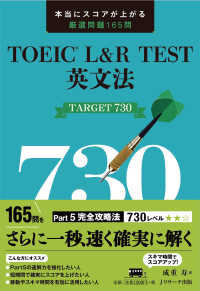Description
The Oxford Handbook of Arts and Cultural Management is a curated, first-line resource for graduate students and scholars that critically and analytically surveys the contemporary research in arts and cultural management and suggests directions for future work. The rigorous and in-depth contributions by both leading and emerging scholars from diverse national and disciplinary backgrounds emphasize public and nonprofit arts and cultural organizations and their social environments, while also touching on creative industry practices. As the field emerges from a post-pandemic world, the Handbook also plays a critical role in envisioning a new future for arts and cultural management research - one that supports movements towards a more equitable, sustainable, and just society.
Table of Contents
Part I. Introduction to Arts and Cultural Management1. Introduction to the Oxford Handbook of Arts and Cultural Management: Where We Are and Where We Are Heading Yuha Jung, Neville Vakharia, and Marilena Vecco2. The Contingencies of an Academic Field: Arts Management Research in CanadaJonathan Paquette and Julie B?rub?3. Analyzing the Cultural and Creative Industries Ecosystem Under the Lens of Complex Adaptive Systems: Beyond the SectorLeonardo Mazzoni, Stefania Oliva, and Luciana Lazzeretti 4. Methods and Methodologies in Arts and Cultural Management Research: A Review and Research AgendaRuth Rentschler and Jiaxin LiuPart II. Theories in Arts and Cultural Management Research5. A Social Value Judgment Model of Corporate Governance in Performing Arts OrganizationsRoy Suddaby, Peter Sherer, Diego Coraiola, and Karl Schwonik6. Open Systems Theory in Arts ManagementYuha Jung and Travis Newton7. Framing Nonprofit Arts and Culture Sectors Through Economic TheoryBruce A. Seaman8. Mapping Theories in Arts and Cultural Management ResearchKate Keeney and Yuha JungPart III. Cultural Policies, Diplomacy, Cultural Planning, and Legal Concerns9. Mapping Cultural Policy: Cultural Bureaucracy as Concept, Norm, and Analytical ToolCarole Rosenstein10. The Future of Cultural Diplomacy: From Digital to Algorithmic Natalia Grincheva11. Cultural Planning and a ?Community Turn? in the Arts: Maximizing Cultural Resources for Social ImpactTom Borrup12. Copyright as an Engine for Creativity: A Critical Appraisal of Contemporary Developments in Intermediaries' Liability RegulationMira Burri13. The Role of Heritage Communities in Cultural Heritage Management: An International Law PerspectiveSimona PintonPart IV. Leadership and Governance in Arts and Cultural Organizations14. Ethics in Cultural Leadership: Relationships of ValueJonathan Price15. Shared Leadership and the Evolution of Festivals: What Can Be Learned?Josephine Caust and Kim Goodwin16. The Death of white Supremacy Culture in the US Creative Sector and Implications for Arts Management: A Critical Race Theory ViewQuanice Floyd and Antonio C. Cuyler17. An Explorative Study on State-Owned Museum Performance in Italy: The Interplay between the Director's Characteristics and Board DiversityPaola Dubini and Alberto MontiPart V. Management Structures and Strategies for Arts and Cultural Organizations18. Event Co-Creation: A Participatory Perspective to Arts and Cultural ManagementLeonore van den Ende19. Knowledge Management in Arts and Cultural Organizations: A Conceptual Framework for Organizational PerformanceNeville Vakharia20. Project Management for Cultural Events: Towards a Systemic ApproachLucio Argano 21. A New Wave in Cultural Workers Rachel Shane and Josh AustinPart VI. Marketing of Arts and Cultural Organizations22. Games and Museums: A Novel Approach to Attracting and Retaining AudiencesMarta Pizzetti and Giulia Miniero23. The Relationship Between Marketing and Fundraising for Arts and Cultural OrganizationsHyunjung Lee, Kyoungnam Ha, and Youngseon Kim24. Creation and Consumption Experience of Cultural Value in Contemporary ArtIan Fillis, Boram Lee, and Ian Fraser25. Servicescape Concept in the Cultural and Creative SectorsChristian JulmiPart VII. Financing and Fundraising of Arts and Cultural Organizations26. An International Perspective on Arts and Cultural Funding: Private, Public, and Hybrid ModelsLin Yi and Huihui Luo27. Contemporary Findings on Individual Donations and Fundraising StrategiesJennifer Wiggins28. Tax Incentives for Arts and Cultural OrganizationsSigrid Hemels29. Non-Fungible Tokens and Non-Profit Management: Participation, Revenue Generation, and Strategic PlanningHeather R. Nolin and Amy C. WhitakerPart VIII. Audience Development: Participation, Engagement, and Evaluation30. Improving Accessibility and Inclusion in the Performing Arts for People with Disabilities: Moving Beyond a "Checking-the-Boxes" ApproachAllison Amidei and Elena SV Flys31. Performance Evaluation in the Arts: A Multidisciplinary Review and a New Pragmatic Research AgendaFrancesco Chiaravalloti32. Evaluating Cultural Value: The Quintessential Wicked ProblemBen Walmsley33. Measuring Customer Multisensory Experience in Live MusicManuel Cuadrado-Garc?a, Juan D. Montoro-Pons, and Claudia E. Goyes-YepezPart IX. Entrepreneurship and Intrapreneurship in Arts and Cultural Organizations34. Entrepreneurship in Culture: Concepts, Perspectives, Success FactorsElmar D. Konrad and Marilena Vecco35. Engaged Dissent: Entrepreneurship and Critique in the Institutional Practice of Three Contemporary ArtistsAdrienne Callander36. Assessing the Business Model of Creative and Cultural Organizations Participating in the European Capital of Culture Program Giovanni Schiuma, Daniela Carlucci, Francesco Santarsiero, and Rosaria Lagrutta37. Cultural Firms' Performance from a Regional Development Perspective: Evidence from EuropeAndrej Srakar and Marilena VeccoPart X. Future Directions for Arts and Cultural Management 38. The Globalized and Changing Landscape of the Arts: The Era of Post-Pandemic and Civil UnrestPier Luigi Sacco39. Aligning Arts Research with Practitioner Needs: Beyond GeneralizationsSunil Iyengar
-

- 電子書籍
- オークション・ハウス (14)
-

- 電子書籍
- オークション・ハウス (2)






